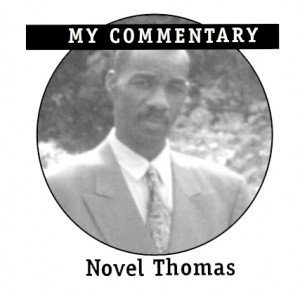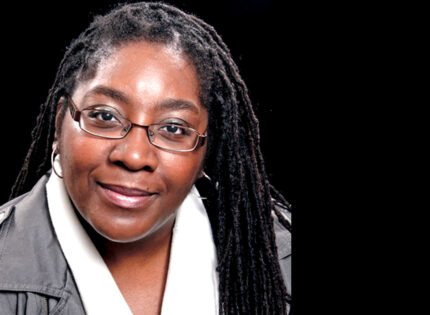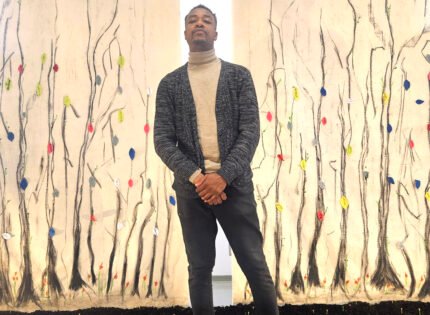Black History Remnants…
That  Africa has the natural and human resources to transform her from beggar to giver is a moot point; there’s bountiful evidence to support that. It is the continuing [hi]story of the continent’s liberating itself (and by extension people across the diaspora) from the debilitating vestiges of slavery, colonialism and neo-colonialism, and the institutional remnants – racism, inequity… all borne of that era.
Africa has the natural and human resources to transform her from beggar to giver is a moot point; there’s bountiful evidence to support that. It is the continuing [hi]story of the continent’s liberating itself (and by extension people across the diaspora) from the debilitating vestiges of slavery, colonialism and neo-colonialism, and the institutional remnants – racism, inequity… all borne of that era.
Truth be told, it’s just a small part, another chapter of our still unfolding [Black] history that continues to impact us, period. Many scholars continue to write about and speak of that part of our illustrious history that predates “contact” when we forced into a black hole of darkness.
When we emerged, we were being rounded up, shackled and chained and prepared for transportation to parts unknown, which we all now know and a still-unfolding pernicious history we’ve been trying to “overcome,” as generations of wise men and women have spoken with great resonance. But that ‘overcoming’ cannot be achieved until Africans at the source overcome the tribalism, and by extension us and our ‘islandism’ and other inter-cultural ‘isms’, lingering conditions here and there that continue to hound/impact us.
Example, there’s a relatively small Spanish-speaking country, named Equatorial Guinea on the west coast of Africa that literally “struck oil” in 1995. Given the global thirst for oil, EG’s discovery should bode well for that country, and especially its less than one million people (757,014 as of last year). But we’re talking about Africa here, so the story, one that we have become vey familiar with, is predictable.
According to an On-line article, Equatorial Guinea “…is now being cited as a textbook case of the resource curse – or the paradox of plenty.” It’s very wealthy. “Since the mid 1990s,” the article continues, “the former Spanish colony has become one of sub-Sahara’s biggest oil producers and in 2004 was said to have the world’s fastest-growing economy.”
This is propitious news for the people of Equatorial Guinea you say?
The article continues, “[…] despite having the highest wealth ranking of any African country, a large proportion of the population still lives in poverty. According to the African Development Bank, while oil and gas revenues have led to improvements in basic infrastructure in recent years, there has been no significant improvement in living conditions for the population…”
Like all other resource-rich African countries, it’s the history (and clichéd story) of post-colonial Africa. “Equatorial Guinea is oil rich, but its people are poor… It’s sub-Saharan Africa’s third biggest oil producer… Oil earnings are allegedly stolen by the ruling elite…The country has exasperated a variety of rights organizations who have described the two post-independence leaders as among the worst abusers of human rights in Africa.”
One of these leaders, Francisco Macias Nguema, conducted a “reign of terror from independence in 1968 until his overthrow in 1979.” He was succeeded by one Teodoro Obiang Nguema Mbasogo (following a coup), a man “who has shown little tolerance for opposition during the close to four decades of his rule.”
According to Human Rights Watch, “President Obiang has used his country’s oil boom to entrench and enrich himself…at the expense of the country’s people.” There’s none of the proverbial “trickle-down” to the mass, the norm in Africa’s many “resource-full” countries. The oil wealth remains firmly in the grip of the president.
The President’s wealth was the subject of a recent BBC documentary. Because of his autocratic rule, the filming, which in part shows how some of the oil money is being spent, was done surreptitiously from a moving car. The dear leader’s massive complex is enclosed by a white Berlin/West Bank-like wall “almost a kilometer long…” running along a major thoroughfare.
It’s Africa, so the story is predictable: his time in power so far has been about personal enrichment, then his son (who has real estate holdings in Europe and elsewhere), as well as the rest of his family, political cronies and others…
And then there are “the people” who have been waiting for the proverbial trickle-down while they live in poverty and squalor… that common African story: amidst abundant resource wealth destitute people are left to fend for themselves, or dependent on NGOs. They are synonymous with Africa’s post-colonial story.
If Africa is to move forward its leaders must take control of the continent, not leave it at the disposal of developed countries (former western colonial powers) that have now been joined by newcomers such as (and especially) China, India… all exploiting land and other natural resources… Africa is on the move, but mostly because of its industrious people. See the evidence on programs like ‘Focus on Africa’ and ‘Africa Business Report’ for the evidence.
Meanwhile that article goes on to state that, “[…] the corruption watchdog Transparency International has put Equatorial Guinea in the top 12 of its list of most corrupt states. In 2008 the country became a candidate of the Extractive Industries Transparency Initiative – an international project meant to promote openness about government oil revenues — but failed to qualify by an April 2010 deadline.” A tacit admission of guilt. But it has since re-applied.
Here’re some other reasons why (resourceful) Africa is the way it is, ”A 2004 U.S. Senate investigation into the Washington-based Riggs Bank found that President Obiang’s family had received huge payments from U.S. oil companies such as Exxon Mobil and Amerada Hess…”
And the hypocrisy… “Observers say the U.S. finds it hard to criticize a country, which is seen as an ally in a volatile, oil-rich region. In 2006, Secretary of State Condoleezza Rice hailed President Obiang as a “good friend” despite repeated criticism of his human rights and civil liberties record by her own department. More recently President Barack Obama posed for an official photograph with President Obiang at a New York reception.”
And more, “[…] In October 2014, President Obiang’s son Teodorin, a government minister, was forced to relinquish more than 30 million dollars of assets in the United States, which the authorities there say were bought with stolen money.”
Africa’s leaders steal the (peoples) money out of Africa and deposit it in Western financial institutions… Equatorial Guinea is just the tip of Africa’s corruption iceberg, which invariably lends to and perpetuates the continent’s bad image.
Cut it how you might, it’s the history of Africa and ‘contact’ being played out. And the historical repercussions are far-reaching.
Qatar
Skyscrapers and cranes silhouetting skylines; modern highways and infrastructure are not only tangible evidence of a country’s development, but also lends to a perception (and reality) of stability. Most importantly, it’s an advertisement to investors that it’s a good country/city open for, and to do, business.
Which is why Doha, capital city of Qatar, stands as another model city, which emerged out of a developing country in the Arabian desert, on the Arabian Peninsula.
Here’s how an article describes Doha, “It breathes deluxe… it celebrates in its most minute detail, Arab culture… it developed at great speed, thanks to money and oil.”
Here’s more, “cranes are everywhere in the Qatari capital, they built everything: highways, roads, a metro homes, skyscrapers (300 by 2020), new five-star hotels (although the city already has 65)…” And here’s an interesting tidbit, “when there’s no more place, no problem: they build (artificial) islands by pushing back the ocean…”
That country’s only natural resource is oil, and the money generated from that product is used efficiently and practically.
Singapore
Fifty years ago Singapore became an independent state, after leaving the short-lived Malaysian Federation. With no natural resources per se, the tiny country was transformed from swamp to one of the Southeast Asia’s leading economies, as a recent BBC documentary showed, “On the strength of its human resources, and immigrants…”
Singaporeans are among the world’s wealthiest populations Ferraris and Rolls Royces are a common sight on the clean streets. It’s a far cry from the island’s humble beginnings, when more than a million Singaporeans lived in “squatters” – makeshift wooden houses in villages known by the Malay term “kampongs,” an article states.
Singapore went from backwater territory in colonial times to a country with one of the largest economies per capita in 2015. And as it celebrates its 50th year of independence from Britain, Singapore is one of the top economies in Asia, indeed the world, what with its vibrant financial sector, hosting companies from around the world.
Enough said.
So what about Africa? It has all the resources (more than Qatar, Singapore all other countries have) and the capacity to be one of Earth’s leading continents, but Africans are still not beneficiaries of their birthright; its corrupt leaders and their selling out to the developed and developing worlds are.
Which is why from a global perspective we’re where we are from the continent across the Diaspora. We’re perpetuating our seemingly infinite historical aftermath of slavery, colonization, neo-colonization, racism, self-hate, colourism… still trying to purge our collective psyche of that toxic historical cocktail.












